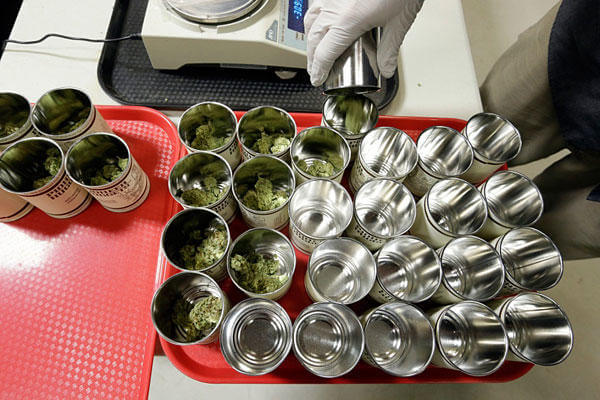A year after the federal government approved a study for the use of marijuana by veterans in treating post-traumatic stress disorder the work may at last get underway.
The National Institute of Drug Abuse on Wednesday informed the Multidisciplinary Association for Psychedelic Studies that it is ready to supply researchers with marijuana needed for the study, Brad Burge, spokesman for MAPS, told Military.com.
The study will mark the first federally approved study in which the subjects will be able to ingest the marijuana by smoking it, he said. It will also be "the first whole-plant marijuana study," meaning the marijuana will not simply be an extract of the cannabis in a manufactured delivery system, such as a pill.
NIDA's decision had been a long time coming, according to Burge, but that delay was only one of the setbacks after the Department of Health and Human Services, the Food and Drug Administration and the Drug Enforcement Agency cleared the way for the research last year.
The plan also was sidetracked because it lost the University of Arizona as one of two testing sites when the school fired the lead researcher, Dr. Suzanne Sisley, after the government approved the project. The university did not explain the sudden termination, though reports at the time suggested the school was looking to avoid conflict with Arizona lawmakers opposed to the study.
Some veterans criticized the firing. Ricardo Pereyda, an Iraq War veteran and alumnus of the university, launched a petition calling for Sisley's reinstatement and university support for the study. The petition garnered more than 100,000 names, but the university did not respond.
"I suffered from severe post-traumatic-stress," Pereyda wrote in the petition. "I was prescribed a cocktail of prescription drugs from the VA for years; they didn't help." He said he began using marijuana exclusively in 2010 to treat multiple symptoms of PTSD, including insomnia, depression, anxiety, and panic attacks. He said the marijuana has helped him "live a more full and productive life."
Shortly after her firing, the state of Colorado awarded Sisley a $2 million grant for her work.
Burge said 76 veterans will take part in the study, which will measure the effects of different potencies of smoked marijuana in treating their symptoms.
In NIDA's message to MAPS Executive Director Rick Doblin on Tuesday, the agency detailed the marijuana it would have available. NIDA has three of the four kinds of marijuana it will need for the study, including a "placebo" strain, according to Doblin,
The Veterans Affairs Department estimates that between 11 and 20 percent of Iraq and Afghanistan war veterans suffer from PTSD. For veterans of the Persian Gulf War, the estimate is 12 percent, and for Vietnam veterans, 15 percent, the VA estimates.
Burge said Sisley is in the process of setting up an independent laboratory as a new test site. For that reason MAPS had to seek renewed approval from HHS, which it got last month. FDA approval was renewed automatically when it did not respond to the amended application after 30 days, he said.
The DEA has still to approve the study again, but Burge does not expect that to be a problem.
The study also has won renewed approval for its research protocol from two university-affiliated institutional review boards. These boards assess study protocols to ensure the safety of the participants and the quality of the research procedures.
The Institutional Review Board at the University of Pennsylvania, where one of the study's principal investigators works, provided approval, as did Copernicus Independent Review Board of North Carolina where Sisley submitted her proposal.
"We are now waiting to hear back from the IRB at Johns Hopkins," which will be the second venue for the actual study, Burge said. "We anticipate getting clearance ... in the next several weeks."
Once the Johns Hopkins board gives its approval and Sisley's research laboratory is in place, MAPS will go to DEA to request the necessary federal license to buy the marijuana, he said.
-- Bryant Jordan can be reached at bryant.jordan@military.com.





























